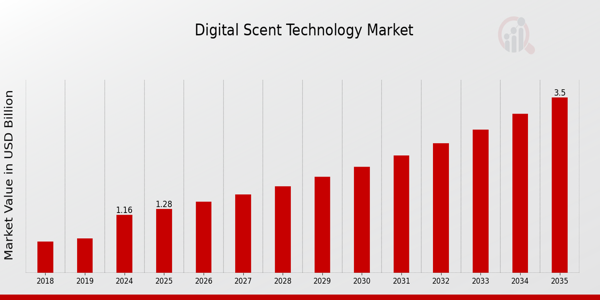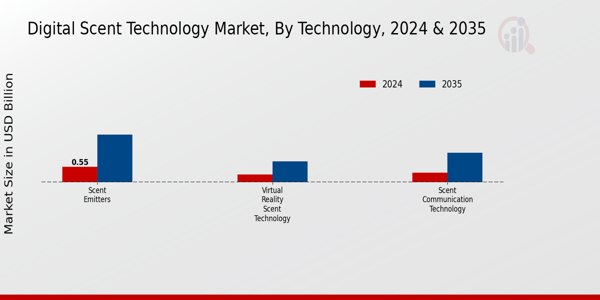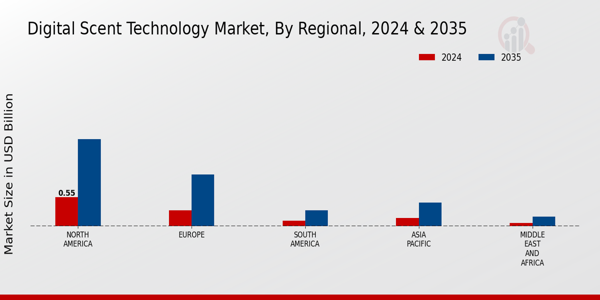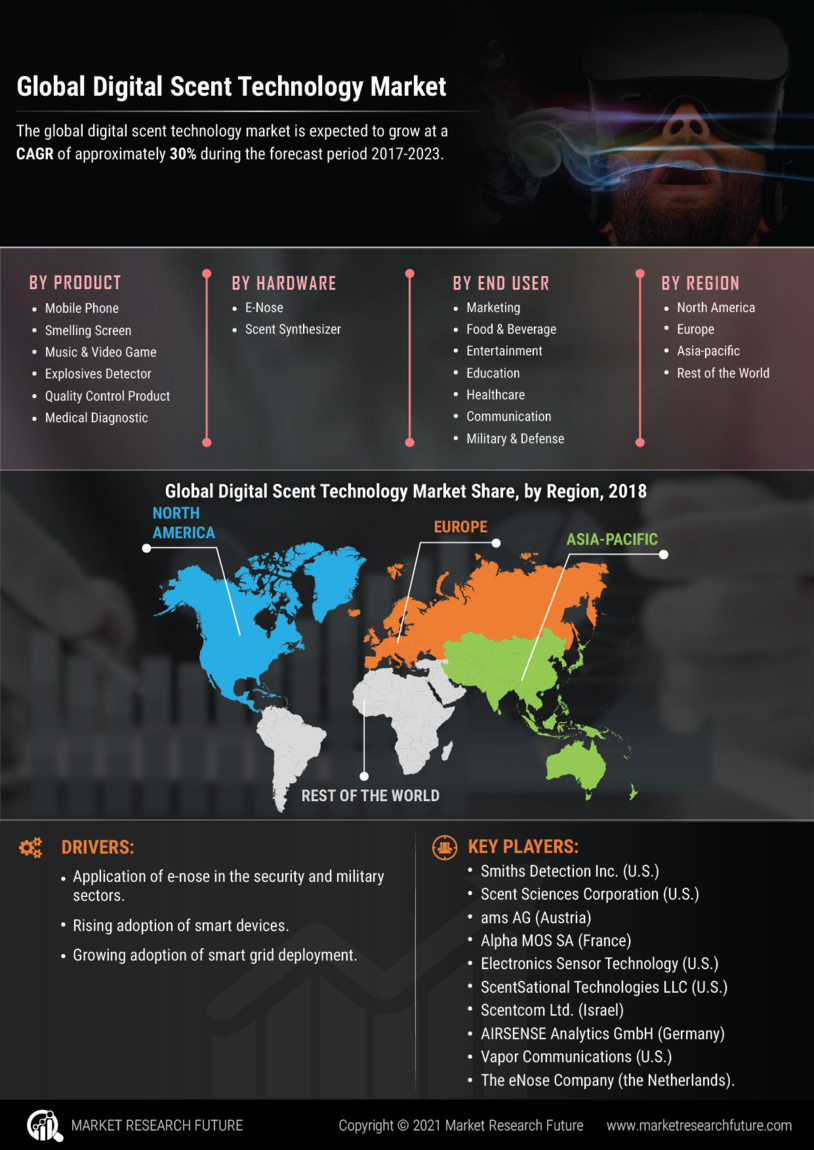Digital Scent Technology Market Summary
As per Market Research Future analysis, the Digital Scent Technology Market Size was estimated at 1.05 (USD Billion) in 2023. The Digital Scent Technology Market Industry is expected to grow from 1.16 (USD Billion) in 2024 to 3.5 (USD Billion) by 2035. The Digital Scent Technology Market CAGR (growth rate) is expected to be around 10.56% during the forecast period (2025 - 2035). The market is driven by increasing consumer demand for immersive experiences across various sectors, including entertainment and healthcare, as well as advancements in scent delivery technologies.
Key Market Trends & Highlights
Key trends driving the Digital Scent Technology Market include advancements in technology and rising consumer interest.
- The market is expected to reach 1.16 USD Billion in 2024, growing to 3.5 USD Billion by 2035.
- Scent Emitters segment valued at 0.5 USD Billion in 2024, projected to reach 1.45 USD Billion by 2035.
- Healthcare applications are increasingly utilizing scent technology for therapeutic purposes, enhancing patient treatment.
- North America is projected to dominate the market, growing from 0.5 USD Billion in 2024 to 1.5 USD Billion by 2035.
Market Size & Forecast
2023 Market Size: USD 1.05 Billion
2024 Market Size: USD 1.16 Billion
2035 Market Size: USD 3.5 Billion
CAGR (2025-2035): 10.56%
Largest Regional Market Share in 2024: North America.
Major Players
Key players include Aroma Digital, The Dentsu Group, Olorama Technology, Aromyx, International Flavors and Fragrances, Sensory Innovations, Givaudan, eScentia, Sensory Cloud, Scentsational Technologies, Nexosensory, Frutarom, Scentys, Air Aroma, and Olfactory Labs.
Key Digital Scent Technology Market Trends Highlighted
Significant trends are being observed in the Digital Scent Technology Market, which is being driven by the growing demand for immersive experiences and technological advancements. The increasing popularity of augmented reality (AR) and virtual reality (VR) applications is a significant market driver, as they incorporate scent to improve the user experience. This integration enables users to more thoroughly engage with digital content, resulting in more lifelike and enjoyable experiences.
Additionally, the gaming and entertainment industries are expanding, which is driving the demand for fragrance technology innovations. This is due to the desire of companies to offer a more comprehensive experience to consumers. Scent technology can be instrumental in a variety of industries, such as healthcare, education, and marketing, which presents opportunities for development in this market. In the realm of marketing, brands are investigating the potential of fragrance to influence consumer behavior and purchasing decisions. They are employing digital scent applications to develop advertising campaigns that are memorable.
Aromatherapy and treatment options that employ scent technology are gaining popularity in the healthcare sector, providing patients with alternative therapeutic methods.
The heightened capabilities of digital fragrance delivery systems have been facilitated by the growing collaboration between technology firms and scent developers, as evidenced by recent trends. The goal is to achieve precision in scent replication, which is why regions worldwide are beginning to invest in research and development to enhance scent calibration and release methods.As the market landscape continues to evolve, these developments are essential, as they provide companies with new opportunities for innovation and differentiation.
The Digital Scent Technology Market is poised for a dynamic future, as a result of the convergence of technology integration, cross-industry applications, and elevated consumer expectations. This has prompted stakeholders to investigate novel opportunities.

Source: Primary Research, Secondary Research, Market Research Future Database, and Analyst Review
Digital Scent Technology Market Drivers
Rising Demand for Immersive Experiences in Entertainment and Gaming
The growing trend of immersive experiences in the entertainment and gaming industry is a significant driver of the Digital Scent Technology Market. Consumers are increasingly seeking engaging and multi-sensory experiences beyond visual and audio stimulation. According to a report from the Entertainment Software Association, approximately 65% of Americans play video games as of 2023, reflecting an ever-growing market. Major companies like Sony and Microsoft are investing heavily in integrating scent technology into their gaming platforms.Sony’s development of scent-enabled gaming solutions demonstrates the potential of Digital Scent Technology to enhance user engagement significantly.
This growing demand for captivating sensory experiences is driving innovations in scent technology applications, leading to projected growth in the Digital Scent Technology Market.
Increased Adoption in Health and Wellness Sectors
An increasing focus on health and wellness is contributing to the growth of the Digital Scent Technology Market. Innovative applications in aromatherapy and mental health treatments are gaining ground, with evidence suggesting that specific scents can significantly affect mood and stress levels. For instance, a study published by the National Institute of Health found that approximately 80% of participants experienced improved mood and reduced anxiety levels when exposed to certain scents.Companies like Aura Cacia are leveraging this potential by integrating digital scent technology into their wellness products, further driving demand as healthcare solutions evolve.
The mounting evidence on the impact of scents in promoting mental and emotional well-being underscores the expansive growth potential in this industry sector.
Technological Advancements and Innovations
Rapid advancements in Digital Scent Technology are a critical driver for the Digital Scent Technology Market Industry. Innovations like miniaturized scent dispensers and improved scent delivery systems are making it easier to integrate scent technology in various applications, from advertising to virtual reality experiences. In 2022, researchers from multiple universities collaborated and filed over 25 patents focusing on scent technology, highlighting the interest and potential for innovation.Companies such as Feelreal are at the forefront, developing multi-sensory devices that enhance virtual reality by integrating scent into the experience.
This wave of technological advancements will play a crucial role in expanding the market and making digital scent more accessible and appealing to consumers.
Digital Scent Technology Market Segment Insights
Digital Scent Technology Market Technology Insights
The Digital Scent Technology Market is experiencing significant growth, driven by advancements in technology and the increasing desire for immersive experiences. By 2024, the market is projected to reach a valuation of 1.16 USD billion, reflecting the rising demand for innovative scent solutions across various industries, including entertainment, marketing, and healthcare. The segmentation within this market highlights specific areas of focus, notably Scent Emitters, Scent Communication Technology, and Virtual Reality Scent Technology.
Scent Emitters are projected to dominate the market significantly, with a valuation of 0.55 USD billion in 2024 and expected to rise to 1.7 USD billion by 2035.Their importance stems from their ability to enhance user experiences by delivering scents that complement visual and auditory stimuli, making them a crucial element in fields like virtual reality and advertising. Scent Communication Technology, valued at 0.34 USD Billion in 2024, is anticipated to grow towards 1.05 USD Billion by 2035, showcasing the rising trend of digital marketing strategies that integrate scent as a means to engage consumers more effectively.
This technology allows for remote scent transmission, creating opportunities in telecommunications and online retail, enhancing the overall consumer experience.Virtual Reality Scent Technology, while currently valued at 0.27 USD Billion in 2024, is projected to grow to 0.75 USD Billion by 2035, signifying its emerging role in the entertainment industry, where providing a full sensory experience can greatly impact user immersion. As global industries recognize the value of scent in enhancing brand experiences and emotional connections, the trends in the Digital Scent Technology Market will drive innovations and open up new avenues for application.
This technology is not just limited to the enhancement of multimedia experiences; it also holds the potential to influence behavioral patterns in fields such as psychology, marketing, and education, making it a vital segment of the broader technology landscape.Overall, the market is poised for continued growth, with each segment contributing to the dynamic evolution of scent technology in global markets.

Source: Primary Research, Secondary Research, Market Research Future Database, and Analyst Review
Digital Scent Technology Market Application Insights
The Digital Scent Technology Market is expected to reach a valuation of 1.16 billion USD by 2024, reflecting a robust growth trajectory driven largely by various applications across diverse industries. Within this market, key areas such as Advertising, Healthcare, Entertainment, and Education are emerging as significant contributors. The advertising sub-segment benefits from digital scent technology by enhancing the sensory experience, enabling brands to create memorable campaigns. In Healthcare, the technology offers innovative solutions for therapy and wellness, facilitating diagnosis and treatment through olfactory signals.The Entertainment segment utilizes digital scents to deliver immersive experiences, drawing audiences deeper into narratives and interactions.
Additionally, in Education, digital scent applications are transforming learning environments, making educational content more engaging and stimulating for students. As the Digital Scent Technology Market data grows, the increasing acceptance of sensory marketing, coupled with advancements in technology, presents substantial growth drivers, while potential challenges may arise from standardization and ethical concerns in scent usage.Overall, the Digital Scent Technology Market segmentation highlights a combination of opportunities that align with industry needs and consumer preferences, paving the way for sustained market growth in the coming years.
Digital Scent Technology Market End Use Insights
The Digital Scent Technology Market is projected to reach a valuation of 1.16 billion USD in 2024 and 3.5 billion USD by 2035, reflecting robust growth driven by various factors, including the increasing adoption of sensory experiences in digital applications. The End Use segment encompasses significant areas such as Consumer Electronics, Gaming, Automotive, and Virtual Reality, which play a crucial role in the market's expansion.
Consumer Electronics integrates digital scent technology to create immersive user experiences, enhancing the connection between devices and users.Gaming is rapidly evolving with scent incorporation, providing players with a multi-sensory experience, which is vital for engagement and realism. The Automotive sector leverages this technology to enhance driving experiences, making them more enjoyable and stimulating. Virtual Reality stands as a frontrunner, where scent adds an essential layer to simulated environments, elevating user immersion.
The Digital Scent Technology Market industry faces challenges like technology standardization and manufacturing costs, yet it presents numerous opportunities for innovation and market growth, driven by rising consumer expectations across these sectors.With increasing demand for more comprehensive sensory interactions, the Digital Scent Technology Market segmentation indicates a shift towards integrating scent in digital experiences, making it a pivotal element in consumer satisfaction and product differentiation.
Digital Scent Technology Market Regional Insights
The Digital Scent Technology Market is experiencing significant growth, with North America dominating as the largest regional market, projected to reach 0.55 USD billion in 2024 and grow to 1.65 USD billion by 2035. Technological advancements and a growing interest in sensory experiences in various industries drive this strong presence.
In Europe, the market is valued at 0.3 USD Billion in 2024, expected to rise to 0.98 USD billion in 2035, reflecting increasing investment in Research and Development for scent marketing strategies.South America contributes a smaller share, valued at 0.1 USD Billion in 2024 and growing to 0.3 USD billion by 2035, indicating a developing awareness of digital scent applications. The Asia Pacific region, valued at 0.15 USD billion in 2024, is anticipated to grow to 0.45 USD billion by 2035, spurred by expanding consumer electronics markets and innovative uses in entertainment.
Lastly, the Middle East and Africa, with a valuation of 0.06 USD billion in 2024, are expected to increase to 0.18 USD billion by 2035, showing emerging opportunities but remaining the least dominant in terms of market share.Each region represents a unique opportunity for the Digital Scent Technology Market revenue growth, influenced by distinct cultural factors and technological adoption rates.

Source: Primary Research, Secondary Research, Market Research Future Database, and Analyst Review
Digital Scent Technology Market Key Players and Competitive Insights
The Digital Scent Technology Market is gaining traction as innovative advancements converge with consumer demands for multi-sensory experiences. This market leverages digital platforms to create and replicate scents, catering to various sectors such as entertainment, healthcare, and advertising. The competitive landscape is characterized by diverse players aiming to harness the potential of scent technology to enhance user engagement and interaction.
In this context, companies not only focus on research and development but also seek strategic partnerships, acquisitions, and collaborations to improve their market positioning and technological capabilities, ultimately influencing consumer behavior and market growth.
DigiScents has established itself as a pioneer within the Digital Scent Technology Market, utilizing its proprietary technologies to deliver digital scent experiences across multiple applications. The company’s strengths lie in its unique scent-generating devices, which allow users to experience realistic aromas directly from their devices.
DigiScents has built strong relationships with various content creators and brands, enhancing its market presence by positioning its products as essential tools for creating immersive and memorable experiences. The company’s focus on user-friendly interfaces and compatibility with leading digital platforms has further solidified its standing in the market, making it a formidable player in the evolving landscape of digital scent technology.eNoses has carved out a niche within the Digital Scent Technology Market with its emphasis on odor detection and qualitative assessment tools.
The company specializes in designing advanced electronic noses that replicate human olfactory systems, catering primarily to industries such as food quality control, environmental monitoring, and healthcare. eNoses stands out with its range of key products that include portable odor-detecting devices, thus appealing to a diverse clientele.
The company's strong market presence is bolstered by strategic collaborations and potential mergers that enhance product offerings and expand into new markets. With an emphasis on innovation and technology enhancement, eNoses’s strengths lie in its research capabilities and ability to adapt to market changes, making it a key player in the global scope of digital scent technology.
Key Companies in the Digital Scent Technology Market Include
- eNoses
- Scentys
- ScentAir
- Air Aroma
- AromaScan
- Alpha MOS
- SensoryCloud
- Olfactomics
- Aromajoin
Digital Scent Technology Market Industry Developments
The Digital Scent Technology Market has witnessed several notable developments recently. Companies like Scentys and ScentAir are gaining traction due to the rising consumer interest in immersive experiences, particularly in sectors such as entertainment and marketing. Growth in the market valuation has also been propelled by advancements in olfactory technology, with organizations like DigiScents and AromaScan innovating in scent delivery systems, which enhance user engagement in various applications.
W Smell Made Digital secured USD 2.2 million in August 2024 to fund the production of digital scents. The initial application of OW Smell Made Digital's digital aroma technology is intended to improve the quality of sleep. It intends to license its AI platform and hardware technology to industry collaborators in order to create personalized fragrances that improve sleep.
In June 2024, Aroma Bit, Inc. created a prototype of an e-nose, a novel odor imaging sensor device that utilizes CMOS semiconductors. A/D converter circuits and peripheral driver circuits are incorporated into this innovative sensor chip, which has a sensor element area of 1.2 x 1.2 mm.
Pine Tree Lincoln, a car dealer in Canada, introduced the Digital Scent Collection in April 2024. This collection was exclusively designed for the 2024 Nautilus, a midsize SUV. Lincoln Pine Tree. The company expanded its fragrance selection by incorporating seven digital in-cabin perfumes. These fragrances are intended to create a unique and refreshing atmosphere within the interior of the new SUV. They were developed in collaboration between Lincoln designers and professional perfumers.
Digital Scent Technology Market Segmentation Insights
-
Digital Scent Technology Market Technology Outlook
- Scent Emitters
- Scent Communication Technology
- Virtual Reality Scent Technology
-
Digital Scent Technology Market Application Outlook
- Advertising
- Healthcare
- Entertainment
- Education
-
Digital Scent Technology Market End Use Outlook
- Consumer Electronics
- Gaming
- Automotive
- Virtual Reality
-
Digital Scent Technology Market Regional Outlook
- North America
- Europe
- South America
- Asia Pacific
- Middle East and Africa
|
Report Attribute/Metric
|
Details
|
|
Market Size 2023
|
1.05(USD Billion)
|
|
Market Size 2024
|
1.16(USD Billion)
|
|
Market Size 2035
|
3.5(USD Billion)
|
|
Compound Annual Growth Rate (CAGR)
|
10.56% (2025 - 2035)
|
|
Report Coverage
|
Revenue Forecast, Competitive Landscape, Growth Factors, and Trends
|
|
Base Year
|
2024
|
|
Market Forecast Period
|
2025 - 2035
|
|
Historical Data
|
2019 - 2024
|
|
Market Forecast Units
|
USD Billion
|
|
Key Companies Profiled
|
eNoses, Scentys, ScentAir, Air Aroma, AromaScan, Alpha MOS, SensoryCloud, Olfactomics, Aromajoin
|
|
Segments Covered
|
Technology, Application, End Use, Regional
|
|
Key Market Opportunities
|
Integration with virtual reality experiences, Growth in mobile gaming applications, Expanding e-commerce fragrance sales, Enhanced marketing and advertising strategies, Innovations in scent delivery devices
|
|
Key Market Dynamics
|
rising demand for immersive experiences, technological advancements in scent delivery, increasing applications in marketing, growth in virtual reality adoption, growing consumer interest in olfactory experiences
|
|
Countries Covered
|
North America, Europe, APAC, South America, MEA
|
Digital Scent Technology Market Highlights:
Frequently Asked Questions (FAQ):
The expected market size of the Digital Scent Technology Market in 2024 is valued at 1.16 USD billion.
By 2035, the Digital Scent Technology Market is expected to be valued at 3.5 USD billion.
The expected CAGR for the Digital Scent Technology Market from 2025 to 2035 is 10.56%.
In 2024, North America is expected to have the largest market share, valued at 0.55 USD billion.
The projected market size for Scent Emitters technology is expected to reach 1.7 USD billion by 2035.
Key players in the market include DigiScents, eNoses, Scentys, ScentAir, P & M Aromas, and others.
The market size for the Scent Communication Technology segment is expected to be valued at 0.34 USD billion in 2024.
Asia Pacific is anticipated to experience significant growth, expanding to 0.45 USD billion by 2035.
The market value for the Virtual Reality Scent Technology segment is expected to reach 0.75 USD billion by 2035.
The expected market value for South America in 2035 is projected to be 0.3 USD billion.

















